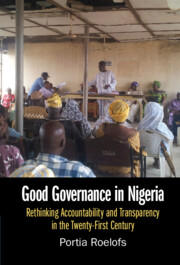Book contents
- Good Governance in Nigeria
- Good Governance in Nigeria
- Copyright page
- Dedication
- Epigraph
- Contents
- Figures
- Tables
- Acknowledgements
- Abbreviations
- Major Characters
- Map of Nigeria
- Additional material
- Introduction
- 1 Contested Legacies of Good Governance
- 2 Good Governance, What’s Not to Love?
- 3 Be Accessible! Accountability, Performance and the Politician Who Is ‘Always in a Meeting’
- 4 Theorising Accountability as Accessibility
- 5 Transparency in People
- 6 Socially Embedded Good Governance
- Conclusion
- Appendix: Methods and Methodology
- Glossary of Yoruba Terms
- Select Bibliography
- Index
3 - Be Accessible! Accountability, Performance and the Politician Who Is ‘Always in a Meeting’
Published online by Cambridge University Press: 13 April 2023
- Good Governance in Nigeria
- Good Governance in Nigeria
- Copyright page
- Dedication
- Epigraph
- Contents
- Figures
- Tables
- Acknowledgements
- Abbreviations
- Major Characters
- Map of Nigeria
- Additional material
- Introduction
- 1 Contested Legacies of Good Governance
- 2 Good Governance, What’s Not to Love?
- 3 Be Accessible! Accountability, Performance and the Politician Who Is ‘Always in a Meeting’
- 4 Theorising Accountability as Accessibility
- 5 Transparency in People
- 6 Socially Embedded Good Governance
- Conclusion
- Appendix: Methods and Methodology
- Glossary of Yoruba Terms
- Select Bibliography
- Index
Summary
This chapter argues for a conception of accountability as accessibility. Drawing on qualitative fieldwork with local politicians, market traders and NGO activists in Ibadan, Oyo State, it shows the ubiquity of calls for accessibility in Nigeria and beyond. Politicians are accessible insofar as they maintain spaces for direct contact between themselves and their constituents. At the level of theory, accessibility reveals a blind spot in dominant conceptions of accountability, which rely on principal–agent models, and poses new conceptual questions about the interaction between communication and sanctioning power. Thus, Nigerian political discourse gives us the language to describe a universal but neglected aspect of accountability and hints at a more socially embedded approach to good governance. Political competition in the twenty-first century southwest Nigeria shows how the politics of competing conceptions of accountability play out in practice. The rise and fall of the ‘Lagos model’ in Oyo and Ekiti states can be understood as a struggle over different conceptions of democratic accountability. Where technocratic notions of good governance insulate decision-makers from their constituents and favour abstract data over face-to-face interaction, it leaves open the field for populist politicians to promise accessibility through exaggerated, almost pantomime performances of connection and communication.
Keywords
- Type
- Chapter
- Information
- Good Governance in NigeriaRethinking Accountability and Transparency in the Twenty-First Century, pp. 146 - 174Publisher: Cambridge University PressPrint publication year: 2023

